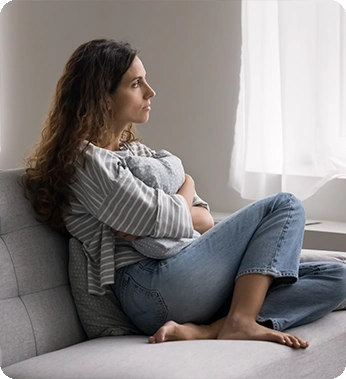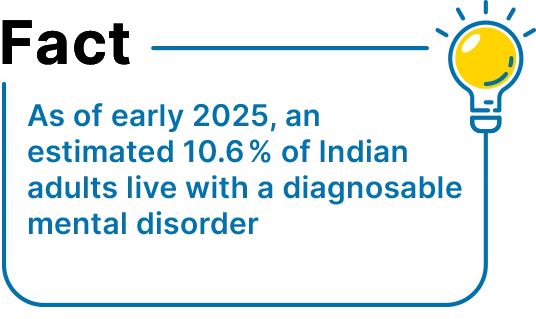Depression Homeopathic Treatment
A Safe & Natural Way to Regain Emotional Strength
Book your Appointment
Depression is not just feeling sad. It's a serious mental health concern that affects how you feel, think, and function in daily life. According to a report by NIMHANS, more than 45 million Indians live with depression, yet most remain undiagnosed due to lack of awareness and social stigma
At Dr Batra’s®, we offer a safe, natural, and side-effect-free approach to treating depression using homeopathy. Our personalised care plans are customised to each patient’s emotional triggers and physical symptoms to ensure holistic healing and long-term emotional stability
Holistic Mental Health Treatment Backed by 40+ Years of Expertise
Root-Cause Diagnosis
Each treatment starts with in-depth analysis of emotional triggers, be it grief, stress, hormonal changes, or lifestyle disruptions, to treat the root cause of depression
Personalised Homeopathic Remedies
We design a treatment unique to your emotional and physical symptoms using safe, non-sedative, and non-habit-forming medicines
Emotional & Physical Support
Our remedies not only stabilise mood and energy but also improve associated issues like fatigue, sleep problems, and appetite loss
Long-Term Wellness Focus
We focus on consistent care that brings emotional clarity, improves daily functioning, and prevents relapses
40+ Years of Expertise
With over 1.5 million satisfied patients across 6 countries, Dr Batra’s® is India’s trusted name in natural mental healthcare
Depression often hides behind everyday behaviours, making it difficult to recognise until it starts affecting every aspect of life
Emotional signs
Constant sadness, irritability or emotional numbness
Physical impact
Low energy, disturbed sleep & changes in appetite
Behavioural shifts
Isolation, lack of interest & reduced productivity
Depression is influenced by a mix of emotional, physical, and environmental stressors
Emotional triggers
Relationship conflicts, disappointment in love, loss, or trauma
Hormonal factors
Thyroid imbalance, menopause, or postpartum period
Genetic influence
Family history of depression increases risk
Lifestyle contributors
Poor dietary routine, sedentary routine & substance abuse
| Feature | Homeopathy | Conventional |
|---|---|---|
| Treats root cause of depression symptoms like chronic stress, grief & hormonal imbalance | ||
| No side effects | ||
| Personalised to individual emotions | ||
| Addresses mental and emotional well-being | ||
| Non-habit forming | ||
| Sustainable mental wellness |
Along with homeopathy, these self-care tips can speed up recovery and emotional resilience
Follow a regular sleep schedule (7–8 hours)
Include mood-boosting foods like nuts, spinach, and fish
Stay active through walks, light exercise, or yoga
Engage in journaling, meditation, or deep-breathing
Limit screen time and avoid stimulants like alcohol or caffeine
Sangeetha battled severe depression with anxiety and insomnia. After starting personalised homeopathic treatment at Dr Batra’s®, her symptoms eased and she made a full recovery. Today, she leads a balanced, depression-free life
At Dr Batra’s®, we understand how complex depression can be, and we’re here to help you feel better naturally and holistically

Yes, it can. Homeopathy addresses emotional, hormonal, and lifestyle triggers to provide long-term recovery from even severe depression
Patients may notice changes in mood or energy within a few weeks. Consistency in treatment helps maintain lasting improvements
Yes. Many homeopathic medicines address overlapping symptoms like worry, panic, fatigue, and sadness together
Yes. Homeopathy is completely natural, non-habit forming, and free from chemical side effects
It depends on the symptoms . Ignatia, Sepia, or Arsenicum Album may be used based on symptoms, emotional history, and medical background